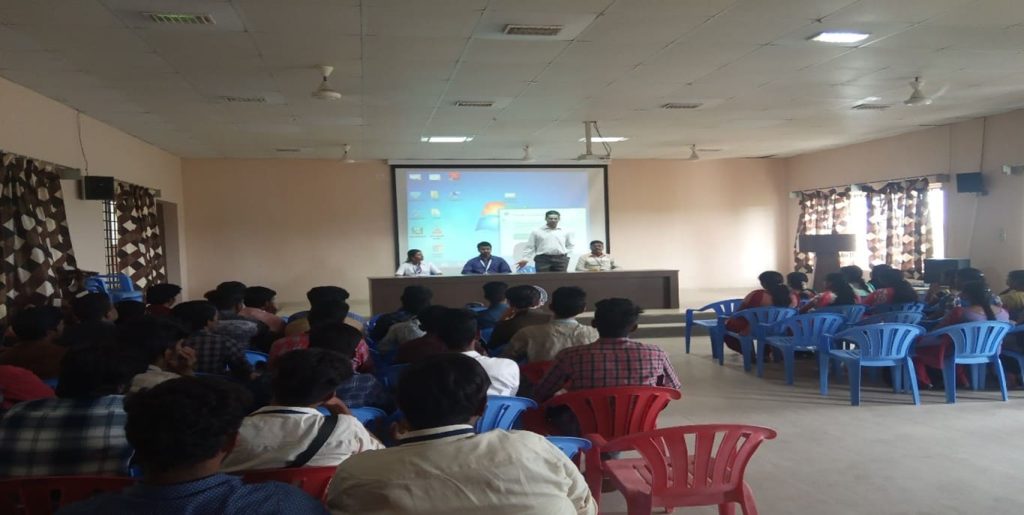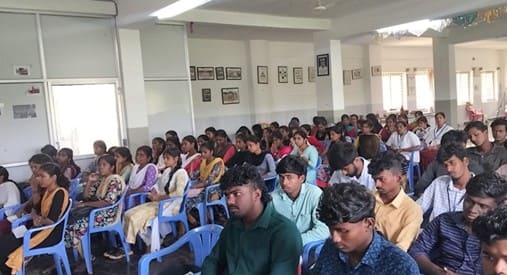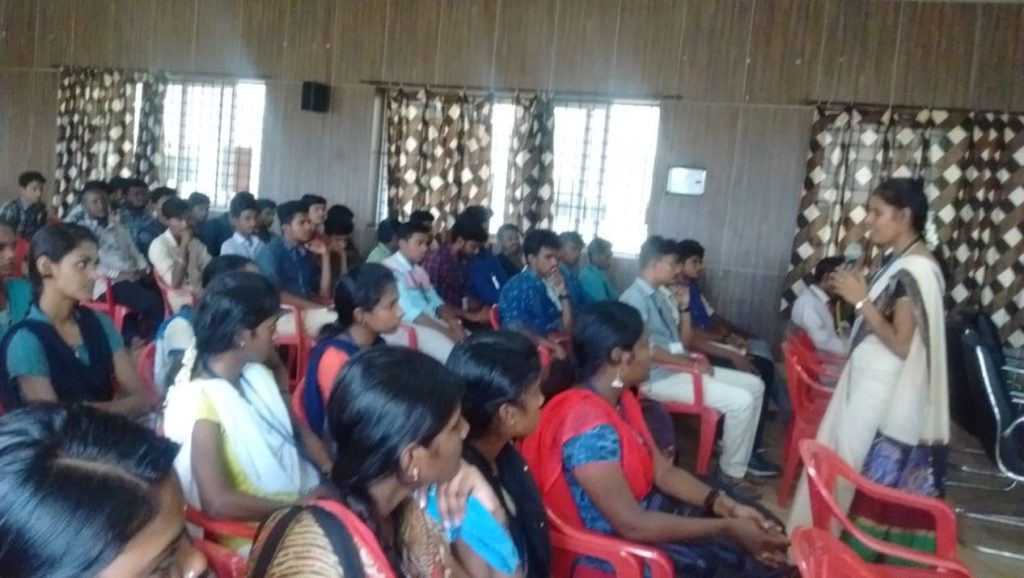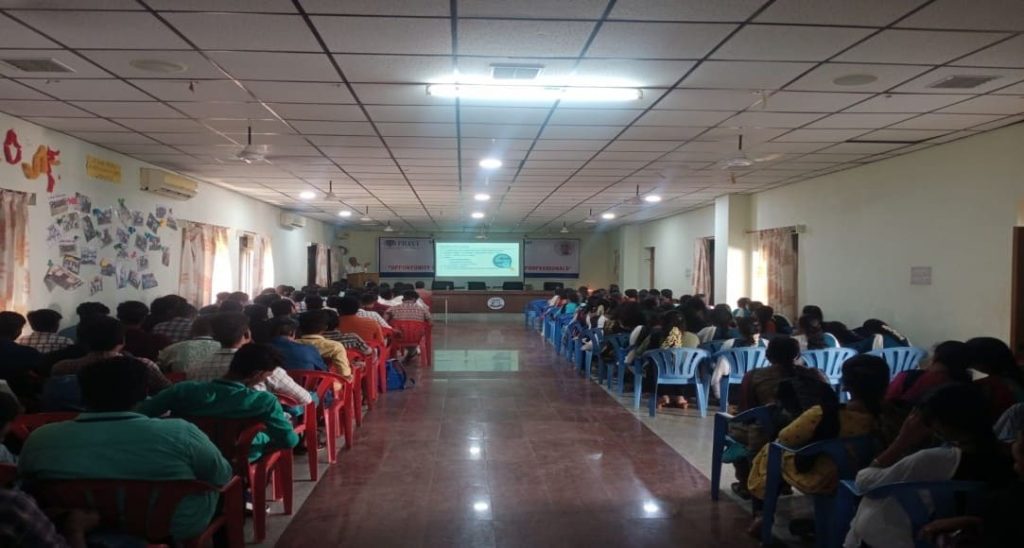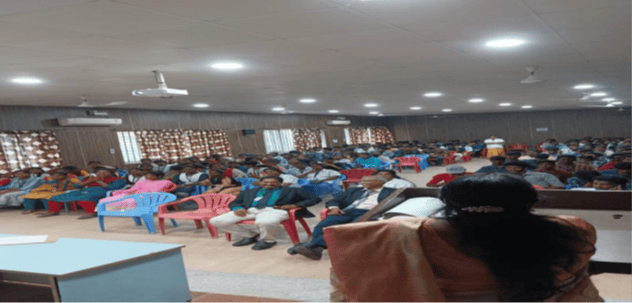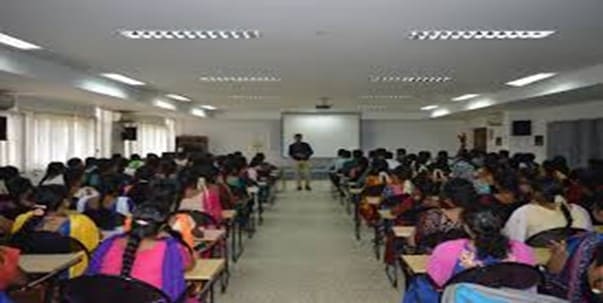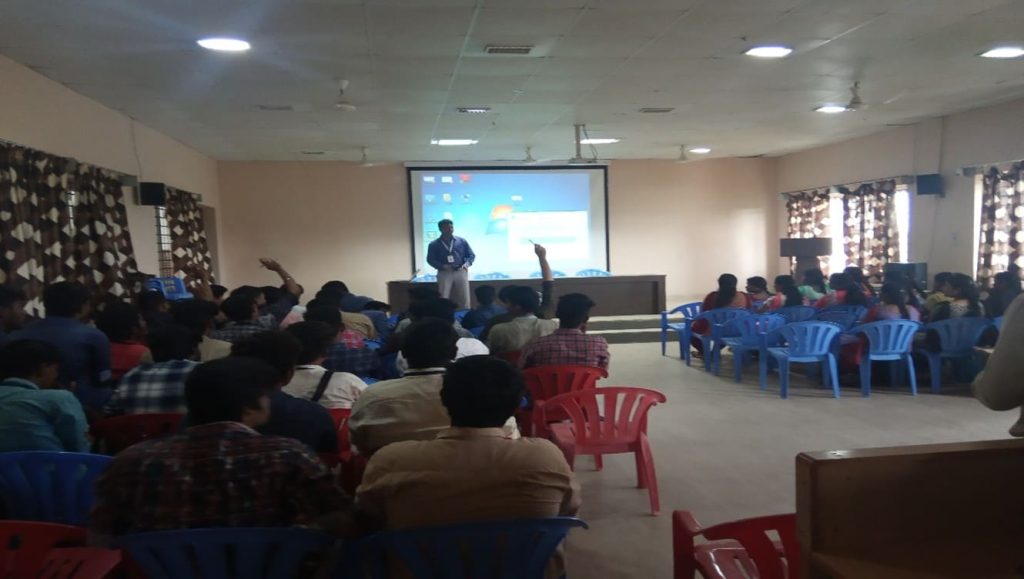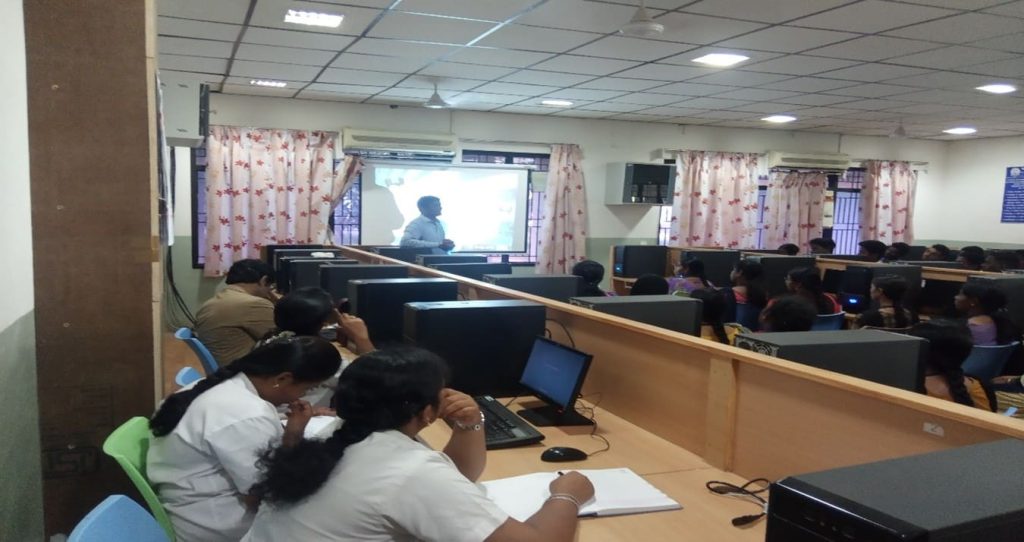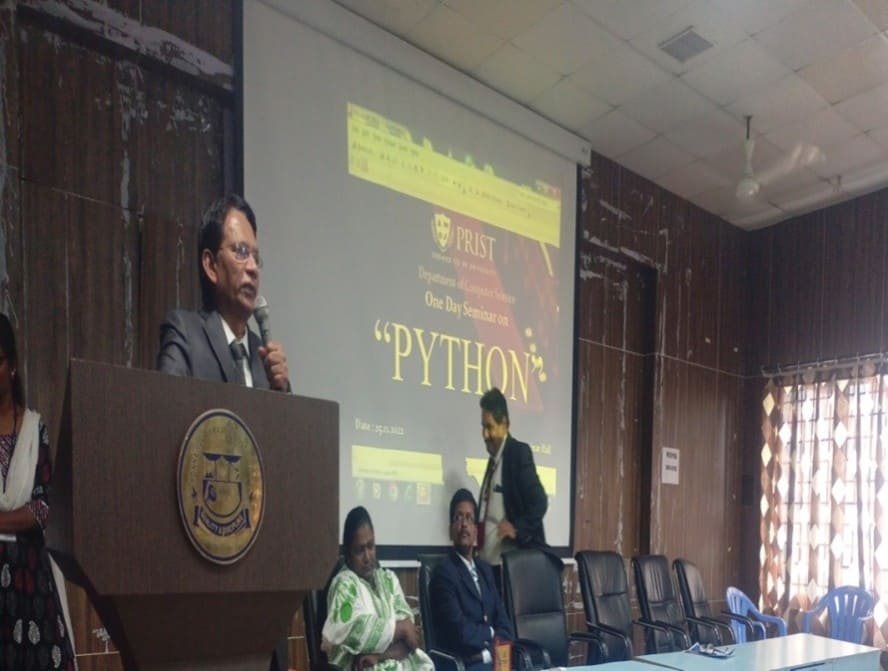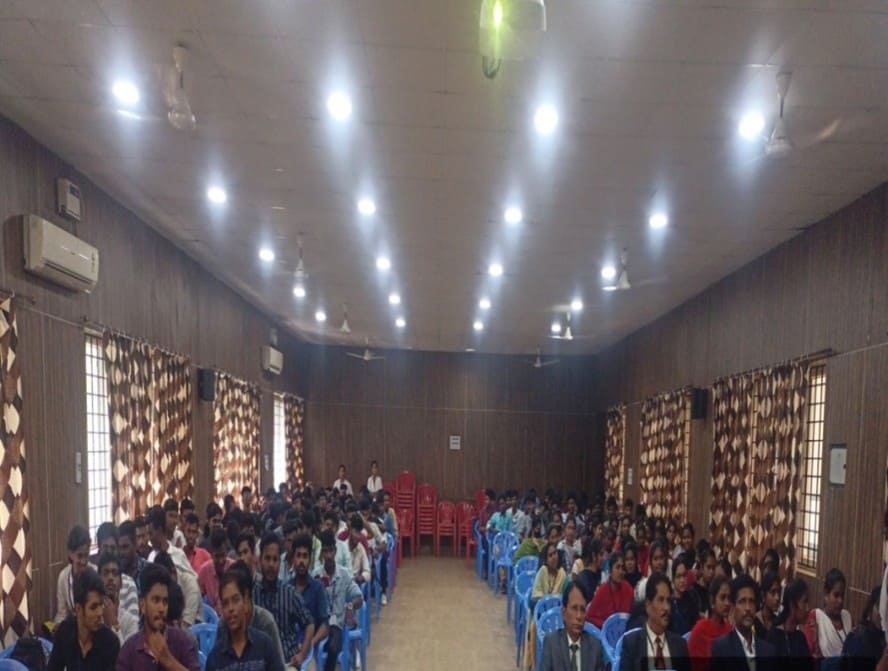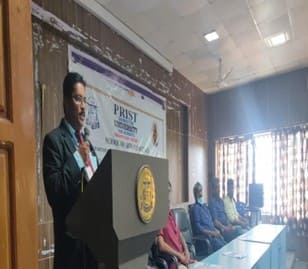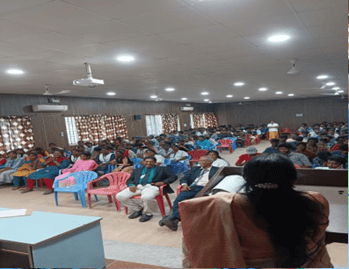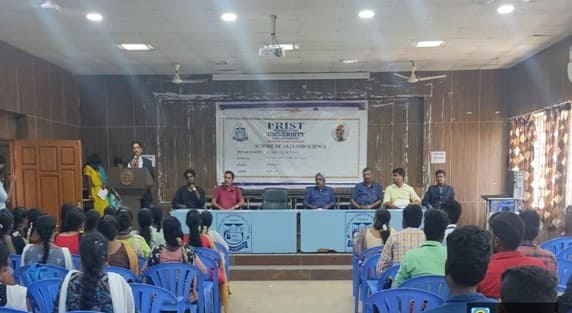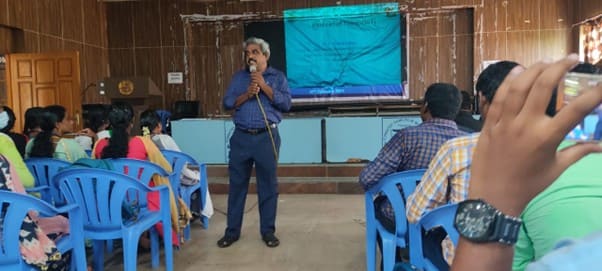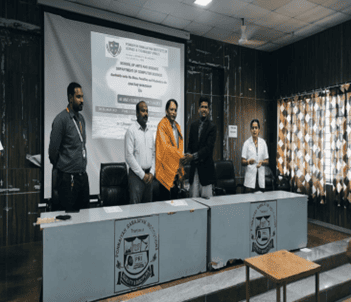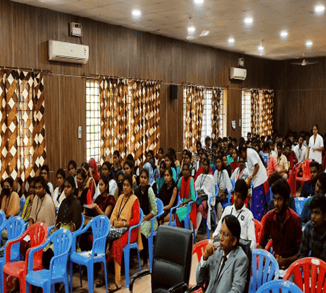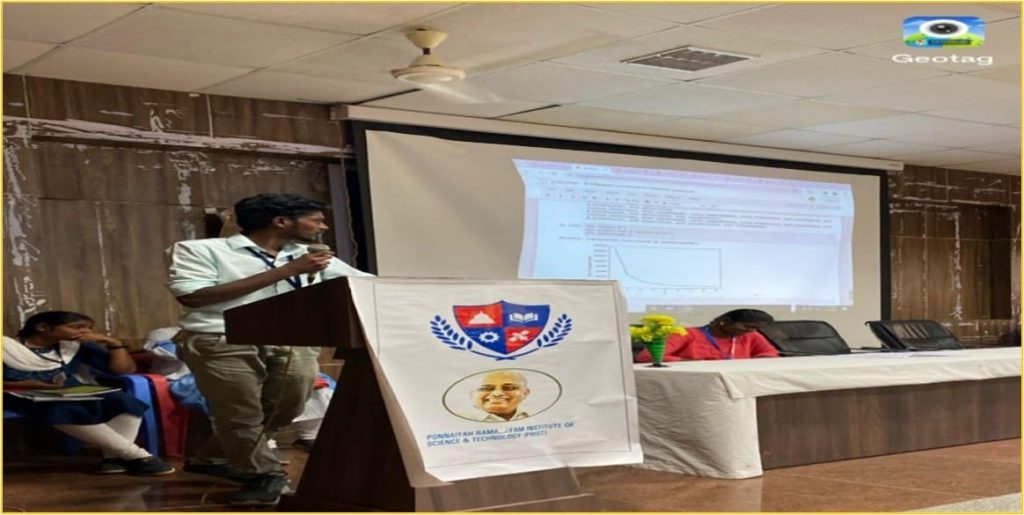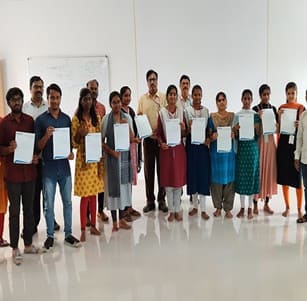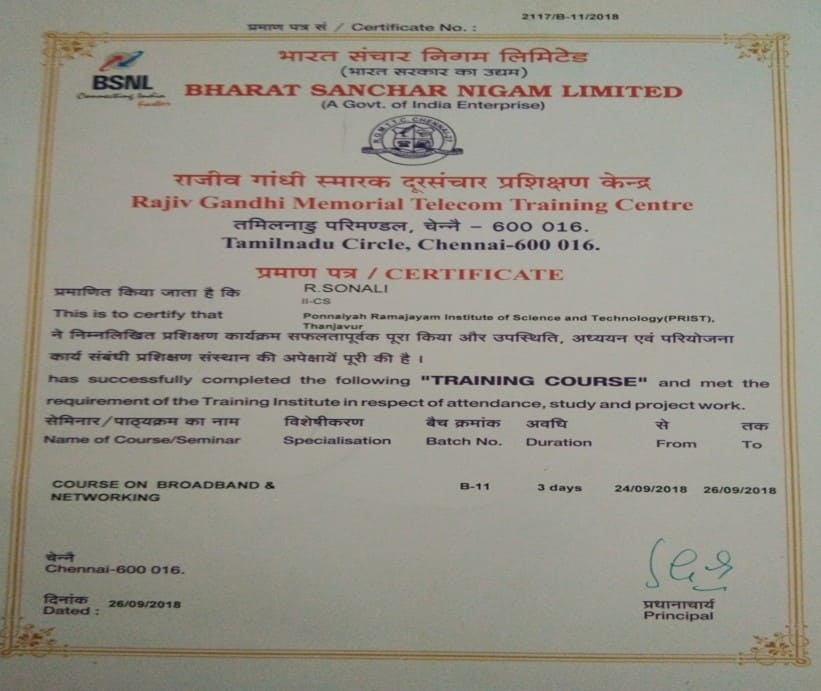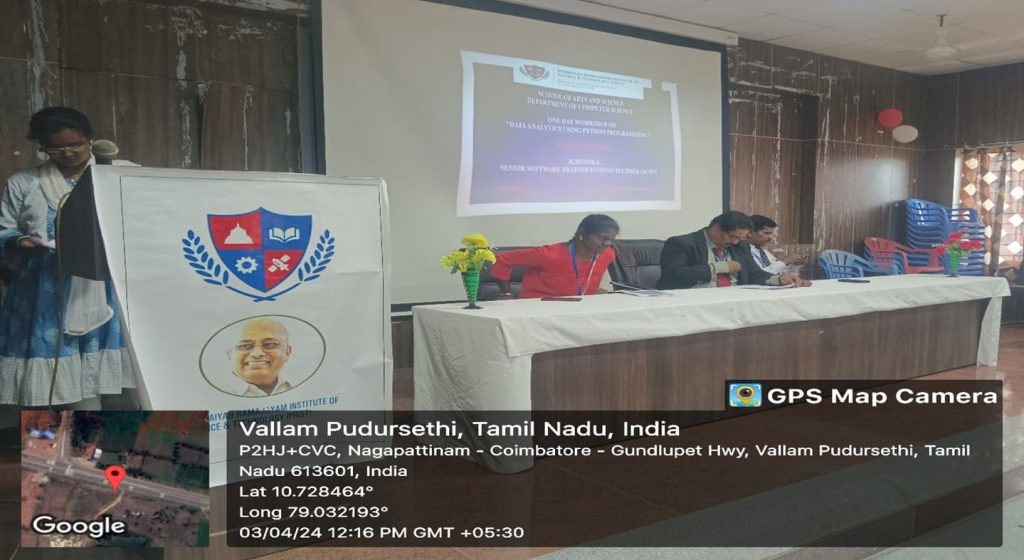The Department of Computer Science was established in 1995. The department offers Undergraduate (from 1995), Masters (from 2003) and Doctoral programs (from 2005). Since 2008, the department has emerged as a full-fledged University department of PRIST Deemed to be University. The department has a dedicated team of staff members and distinguished faculty, trained at renowned Institutes from India and abroad. Apart from teaching, the faculty members are equally committed to research, also. They attract sponsored research from both governmental and non-government bodies.
The department conducts regularly seminars, conferences, workshops, providing a vibrant atmosphere to students to nurture the spirit of scientific inquiry while pursuing the programme in a truly professional environment
Vision:
- To deliver outstanding computer science education and conduct research of high distinction.
- To evolve as a centre of excellence and to adapt to the rapid advancements in the specialized domains of computer science
Mission:
- To provide superior quality education in computer science.
- To turn out graduates who are innovative, confident and possess ability to think critically in issues of computing.
- To be engaged in local, state, and national issues and to suggest solutions for the benefit of society at large.
- To habituate the students to focus on sustainable solutions to improve the quality of life and the welfare of the society.
- To enhance the fabric of research in computing through collaborative linkages with industry and academia.
- To inculcate learning of the emerging technologies to pursue higher studies leading to lifelong learning.
Programme: B.C.A.
Duration: 3 years [UG]
Programme Outcomes:
PO1: Disciplinary knowledge: Capable of demonstrating comprehensive knowledge and understanding of one or more disciplines that form a part of an undergraduate Programme of study.
PO2: Communication Skills: Ability to express thoughts and ideas effectively in writing and orally; Communicate with others using appropriate media; confidently share one’s views and express herself/himself; demonstrate the ability to listen carefully, read and write analytically, and present complex information in a clear and concise manner to different groups.
PO3: Critical thinking: Capability to apply analytic thought to a body of knowledge; analyze and evaluate evidence, arguments, claims, beliefsbased on empirical evidence; identify relevant assumptions or implications; formulate coherent arguments; critically evaluate practices, policies and theories by following scientific approach to knowledge development.
PO4: Problem solving: Capacity to extrapolate from what one has learned and apply their competencies to solve different kinds of non-familiar problems, rather than replicate curriculum content knowledge; and apply one’s learning to real life situations.
PO5: Analytical reasoning: Ability to evaluate the reliability and relevance of evidence; identify logical flaws and holes in the arguments of others; analyze and synthesize data from a variety of sources; draw valid conclusions and support them with evidence and examples and addressing opposing viewpoints.
PO6: Research-related skills: A sense of inquiry and capability for asking relevant/appropriate questions, problem arising, synthesizing and articulating; Ability to recognize cause-and-effect relationships, define problems, formulate hypotheses, test hypotheses, analyze, interpret and draw conclusions from data, establish hypotheses, predict cause-and-effect relationships; ability to plan, execute and report the results of an experiment or investigation
PO7: Cooperation/Teamwork: Ability to work effectively and respectfully with diverse teams; facilitate cooperative or coordinated effort on the part of a group, and act together as a group or a team in the interests of a common cause and work efficiently as a member of a team
PO8: Scientific reasoning: Ability to analyze interprets and draws conclusions from quantitative/qualitative data; and critically evaluates ideas, evidence and experiences from an open-minded and reasoned perspective.
PO9: Reflective thinking: Critical sensibility to lived experiences, with self-awareness and reflexivity of both self and society.
PO10: Information/digital literacy: Capability to use ICT in a variety of learning situations, demonstrate ability to access, evaluate, and use a variety of relevant information sources; and use appropriate software for analysis of data.
PO11: Self-directed learning: Ability to work independently, identify appropriate resources required for a project, and manage a project through to completion.
PO12: Multicultural competence: Possess knowledge of the values and beliefs of multiple cultures and a global perspective; and capability to effectively engage in a multicultural society and interact respectfully with diverse groups.
PO13: Moral and ethical awareness/reasoning: Ability to embrace moral/ethical values in conducting one’s life, formulate a position/argument about an ethical issue from multiple perspectives, and use ethical practices in all work. Capable of demon starting the ability to identify ethical issues related to one’s work, avoid unethical behavior such as fabrication, falsification or misrepresentation of data or committing plagiarism, not adhering to intellectual property rights; appreciating environmental and sustainability issues; and adopting objective, unbiased and truthful actions in all aspects of work.
PO14: Leadership readiness/qualities: Capability for mapping out the tasks of a team or an organization, and setting direction, formulating an inspiring vision, building a team who can help achieve the vision, motivating and inspiring team members to engage with that vision, and using management skills to guide people to the right destination, in a smooth and efficient way.
PO15: Lifelong learning: Ability to acquire knowledge and skills, including ‘learning how to learn’, that are necessary for participating in learning activities throughout life, through self-paced and self-directed learning aimed at personal development, meeting economic, social and cultural objectives, and adapting to changing trades and demands of workplace through knowledge/skill development/ reskilling.
Programme: B.Sc. (CS)
Duration: 3 years [UG]
Programme Outcomes:
PO1: Scientific aptitude will be developed in Students
PO2: Students will acquire basic Practical skills & Technical knowledge along with domain knowledge of different subjects in the Computer Science & humanities stream.
PO3: Students will become employable; Students will be eligible for career opportunities in education field, Industry, or will be able to opt for entrepreneurship.
PO4: Students will possess basic subject knowledge required for higher studies, professional and applied courses.
PO5: Students will be aware of and able to develop a solution-oriented approach towards various Social and Environmental issues.
PO6: Ability to acquire in-depth knowledge of several branches of Computer Science and aligned areas. This Programme helps learners in building a solid foundation for higher studies in Computer Science and applications.
PO7: The skills and knowledge gained lead to proficiency in analytical reasoning, which can be utilized in modeling and solving real life problems.
PO8: Utilize computer programming skills to solve theoretical and applied problems by critical understanding, analysis and synthesis.
PO9: To recognize patterns and to identify essential and relevant aspects of problems.
PO10: Ability to share ideas and insights while seeking and benefiting from knowledge and insight of others.
PO11: Mould the students into responsible citizens in a rapidly changing interdependent society.
Programme: M.C.A.
Duration: PG – Two Years
Programme Outcomes
PO1: Problem Solving Skill – Apply knowledge of Management theories and HumanResource practices to solve business problems through research in Global context.
PO2: Decision Making Skill – Foster analytical and critical thinking abilities for data-based decision-making.
PO3: Ethical Value – Ability to incorporate quality, ethical and legal value-based perspectives to all organizational activities.
PO4: Communication Skill – Ability to develop communication, managerial and interpersonal skills.
PO5: Individual and Team Leadership Skill – Capability to lead themselves and the team to achieve organizational goals.
PO6: Employability Skill – Inculcate contemporary business practices to enhance employability skills in the competitive environment.
PO7: Entrepreneurial Skill – Equip with skills and competencies to become an entrepreneur.
PO8: Contribution to Society – Succeed in career endeavors and contribute significantly to society.
PO9: Multicultural competence – Possess knowledge of the values and beliefs of multiple cultures and a global perspective.
PO10: Moral and ethical awareness/reasoning – Ability to embrace moral/ethical values in conducting one’s life.
Programme M.Sc. CS
Duration PG – Two Years
Programme Outcomes:
PO1: Computational Knowledge – Gain knowledge in the theoretical foundations of Computer Science, Computing Fundamentals and Basic Mathematics.
PO2: Problem Analysis – To analyze and identify the customer requirements in multidisciplinary domains, create high level design and implement robust software applications using the latest technological skills.
PO3: Design and Development– Design and develop solutions for complex problems in various domains. Serve as the Programmers or the Software Engineers with the sound knowledge of practical and theoretical concepts for developing software.
PO4: Research Activity– To understand the fundamentals of research and inculcate the ability to undertake original research at the cutting edge of computer science & its related areas. Produce researchers who can investigate problems in different application domains and creatively develop and evaluate computational solutions.
PO5: Software tool usage– To adapt and apply modern computing skills and tool store solve problems with software development tools, software systems, and modern computing platforms.
PO6: Professional ethics– To understand professional ethics and Cyber regulations and develop out with social commitments.
PO7: Personality development – To understand Management Principles and apply the principles to develop software as a team member and manage projects efficiently for multi disciplinary environments.
PO8: Communication and Presentation Efficacy – Communicate effectively with computing society in both verbal and written form. Improve communication and presentation skills, especially in providing technical support.
PO9: Social Responsibility – To access Social and Environmental issues for local and global needs and give relevant solutions for them. Gained the analytical ability to analyze literature and social issues to appreciate the strength and to suggest the improvements for better results.
PO10: Entrepreneurship– Discover the opportunity for entrepreneurship andcreateandaddvalueforthebettermentofanindividualandsocietyatlarge.
PO11: Algorithmic principles and theory– ability apply mathematical foundations, algorithmic principles, and Computer Science theory in the modeling and design of computational systems in away that demonstrates comprehension of the tradeoffs involved in design choices.
PO12: Teamwork– Solve the problems (programming networking database and Web design) in the Information Technology environment. Function effectively in teams to accomplish a common goal and demonstrate professional behavior.
Faculty Publications
- J sahitha banu , G preethi, empowering sentiment analysis of coursera course reviews with sophisticated artificial bee colony-inspired deep q-networks (sabc-dqn) -Journal of Theoretical and Applied Information Technology(2024), ISSN: 1992-8645, E-ISSN: 1817-3195.
- Jerlin adaikala sundari, G. Preethi, energizing firefly optimization-inspired routing protocol (efoirp) for performance enhancement in iot-based cloud wireless sensor networks (ic-wsn) -international journal of computer networks and applications(2024), doi: 10.22247/ijcna/2024/224441, issn : 2395-0455.
- jerlin adaikala sundari , G.preethi, enhancing quality of service in internet of things-based cloud wireless sensor networks (ic-wsn) using robust frog leap inspired routing protocol (RFLIRP))2023),- Journal of Theoretical and Applied Information Technology, ISSN: 1992-8645, E-ISSN: 1817-3195
- G.preethi,C.mukila, network based on smart security for mesh networks-International Research Journal of Management Sociology and Humanities (IRJMSH)(2022) ,Vol – 13, Issue- 4 , Page(s) : 278 – 283 (2022 ) DOI : https://doi.org/10.32804/IRJMSH, ISSN 2277 – 9809 (online) ISSN 2348 – 9359 (Print).
- Vishal C, Dr.K. Saravanan, An approach for improving data accuracy by contrasting classification and clustering techniques using sentiment analysis-Journal of Advanced Research in Dynamical and Control Systems(2019), Volume 11 | 02-Special Issue, Pages: 1668-1674
- Amudha T, Saravanan K, Security advantages of cloud ERP and its databases in higher education- International Journal of Recent Technology and Engineering(2019), ISSN: 2277-3878 (Online), Volume-8 Issue-2, July 2019
- Venkatesan & K. Saravanan & T. Ramkumar, 2019. “A Big Data Recommendation Engine Framework Based on Local Pattern Analytics Strategy for Mining Multi-Sourced Big Data,” Journal of Information & Knowledge Management (JIKM), World Scientific Publishing Co. Pte. Ltd., vol. 18(01), pages 1-21, March.
- Vishal C, K. Saravanan, Identification on top trends of public opinion using location based sentiment analysis- International Journal of Innovative Technology and Exploring Engineering(2019), ISSN: 2278-3075 (Online), Volume-8 Issue-5, March 2019
- A.Shanthi,Dr.K.Saravanan, an effect of data mining techniques in public healthcare- a case study- International Journal of Civil Engineering and Technology(2018), Volume 9, Issue 9, September 2018, pp. 115–122, Article ID: IJCIET_09_09_014 Available online at http://iaeme.com/Home/issue/IJCIET? Volume=9&Issue=9 ISSN Print: 0976-6308 and ISSN Online: 0976-6316
- M , Suganya.R, MPLS L2-VPN using Atom with Like to Like Circuit using Ethernet at Layer 2- International Journal of Advanced Research in Computer and Communication Engineering (IJARCCE) (2019), ISSN (Online) 2278-1021 ISSN (Print) 2319-5940, Vol. 8, Issue 3, March 2019.
- Malathi, G.Preethi, accessing for quality techniques manet process- International Research Journal of Management Science & Technology (2022), Vol-13, Issue-4,April 2022,DOI-HTTPS://DOI.ORG/10.32804/IRJMST, ISSN-2250-1959(0)2348-9367(p)
- Preethi, B. Vatchala, “Enhanced Ant Colony Optimization Based Secured Routing In Cloud Computing”, International Journal Of Science And Research (IJSR), Volume 10, Issue 7, July 2021. pp: 231 – 239. 6. G. Preethi, K. Kamalakannan, “
- Manoj Kumar Loganathan , K Saravanan, The approaches of regression testing based on cost effective model – International Journal of Applied Engineering Research(2018), ISSN: 2455-4227 Impact Factor: RJIF 5.12 www.allsciencejournal.com Volume 3; Issue 5; September 2018; Page No. 12-15.
- Venkatesan,K. Saravanan,T. Ramkumar, A Big Data Recommendation Engine Framework Based on Local Pattern Analytics Strategy for Mining Multi-Sourced Big Data- Journal of Information & Knowledge Management (2019)-Vol.18,No.01,1950009(2019), https://doi.org/10.1142/S0219649219500096
- A. Shanti and K.Saravanan, Wartortle – A Data Mining and Knowledge Discovery Suite for Data Analysis and Reporting – International Journal of Applied Engineering Research (2019), ISSN 0973-4562 Volume 13, Number 10 (2018) pp. 7835-7841
- kanimozhi, K.Saravanan, LAPRAS and MILOTIC-Innovative algorithms for privacy preserving utility mining – International Journal of Pure and Applied Mathematics(2018, Volume 118 No. 8 2018, 593-600 ISSN: 1311-8080 (printed version); ISSN: 1314-3395 (on-line version),url: http://www.ijpam.eu Special Issue)
- bhuvaneshwari,K.saravan, Secure Association Rule Mining using Array Mapping Table – International Journal of Pure and Applied Mathematics, Volume 118 No. 8 2018, 141-147,ISSN: 1311-8080 (printed version); ISSN: 1314-3395 (on-line version),url: http://www.ijpam.eu Special Issue.
PATENTS
|
S.No. |
INVENTOR(S) &PATENT TITLE |
APPLICATION NUMBER& DATE FILLED |
FILED(F) /PUBLISHED(P) /GRANTED(G) |
|
– |
Nil |
Nil |
Nil |
SEED MONEY GRENTED BY PRIST:
|
S.No. |
PROJECT TITLE |
FACULTY |
GRANT IN Rs. |
|
1 |
An efficient trust evaluation using fact finder technique |
Dr.K.T.Senthil kumar |
10.5 lakhs |
|
2 |
Decisive high-utility item set mining-an innovative algorithm for mining th high utility item sets(2018-19) |
Dr.K.Saravanan |
7.70 Lakhs |
CONSULTANCY:
|
S.No. |
PROJECT TITLE |
FACULTY |
SPONSORING AGENCY |
|
1 |
Intelligent rule-based phishing website classification based on url features. |
M.Aarthi |
AGB infra Tel Private Limited |
|
2 |
Traffical user control system |
P.Sakila |
AGB infra Tel Private Limited |
|
3 |
Security advantages of cloud ERP and its databases in higher education |
Dr.K.Saravanan |
AGB infra Tel Private Limited |
|
4 |
Data Mining Techniques For Medical Diagnosis. |
Dr.R.Maruthi |
AGB infra Tel Private Limited |
SPONSORED RESEARCH PROJECTS:
|
S.No. |
PROJECT TITLE |
FACULTY |
SPONSORING AGENCY |
|
1 |
Implementing AI-Powered Menu Recommendation Systems for Personalized Catering Experiences |
Dr.K.Saravanan |
Sri Chendhoor & Co |
|
2 |
Biometric Authentication for Secure Catering Transactions and Access Control |
Dr.P.Sathya |
Sri Chendhoor & Co |
|
3 |
Cybersecurity Measures for Secure Street Light Control Systems |
M.Aarthi |
Suhas Engineering |
|
4 |
Interactive Media Authoring Tools for Engaging Educational Content Development |
K.Priyadharshini |
Voqzi Media Pvt Ltd |
|
5 |
Cybersecurity Legal Compliance: Assessing Risks and Ensuring Data Protection |
Dr. K.Saravanan |
NPC Org Pvt Ltd |
|
6 |
Automated Production Lines for Apparel Manufacturing: Robotics and AI Integration |
M.Aarthi |
Sri Exports |
|
7 |
Collaborative Networks and Partnerships in Shrimp Export Industry |
P.Sakila |
Royal Marine impex |
|
8 |
Augmented Reality (AR) Shopping Experiences: Interactive Product Visualization for Ecommerce |
R.Rajayogeswari |
AMBC Technologies |
|
9 |
Video Content Optimization for Social Media Platforms: Best Practices and Trends |
K.Vijayabaskar |
AMBC Technologies |
|
10 |
Semantic SEO Strategies: Leveraging AI and Natural Language Processing for Content Optimization |
Dr. Av.Seethalakshmi |
AMBC Technologies |
|
11 |
Legal Implications of Blockchain Technology: Smart Contracts and Digital Assets |
Dr.G Preethi |
NPC Org Pvt Ltd |
|
12 |
Connecting Social Media E-Banking System |
Mrs.R.Banumathi |
Sri Ponnaiyah Ramajayathammal Educational and Charitable Trust |
|
13 |
Emergency ambulance booking android app |
Dr.K.T.Senthil Kumar |
Sri Ponnaiyah Ramajayathammal Educational and Charitable Trust |
|
14 |
Fire accident identification based on alerting location over GSM and GPS |
Dr. K.Saravanan |
Sri Ponnaiyah Ramajayathammal Educational and Charitable Trust |
|
15 |
A public safety application of GPS-enabled smartphones and the android operating system |
Dr. P.Sathya |
Sri Ponnaiyah Ramajayathammal Educational and Charitable Trust |
|
16 |
Financial status analysis using credit score rating based on android |
Dr.G Preethi |
Sri Ponnaiyah Ramajayathammal Educational and Charitable Trust |
|
17 |
Illusion pin based transaction |
Dr.K.T.Senthil Kumar |
Sri Ponnaiyah Ramajayathammal Educational and Charitable Trust |
|
18 |
Online crime management system |
Dr.K.T.Senthil Kumar |
Sri Ponnaiyah Ramajayathammal Educational and Charitable Trust |
|
19 |
Blood bank management system |
Mr.D.S.Chozha Bharathi |
Sri Ponnaiyah Ramajayathammal Educational and Charitable Trust |
|
20 |
E-learning website |
Mrs.R.Suganaya |
Sri Ponnaiyah Ramajayathammal Educational and Charitable Trust |
|
21 |
Data sharing with forward secrecy |
Mr.K.Vijayabasakar |
Sri Ponnaiyah Ramajayathammal Educational and Charitable Trust |
|
22 |
A smart power meter to recharge electric vehicles |
Ms.J.Mangainila |
Sri Ponnaiyah Ramajayathammal Educational and Charitable Trust |
|
23 |
Agriculture deputy webservice |
Mrs.S.Sathya Priya |
Sri Ponnaiyah Ramajayathammal Educational and Charitable Trust |
|
24 |
EB billing and information |
Dr. K.Saravanan |
Sri Ponnaiyah Ramajayathammal Educational and Charitable Trust |
|
25 |
Task management application |
Dr. P.Sathya |
Sri Ponnaiyah Ramajayathammal Educational and Charitable Trust |
|
26 |
Smart parking management system |
Dr.G Preethi |
Sri Ponnaiyah Ramajayathammal Educational and Charitable Trust |
|
27 |
E-Authentication System |
R. Banumathi |
Sri Ponnaiyah Ramajayathammal Educational and Charitable Trust |
|
28 |
Payment billng system |
P.Karthik |
Sri Ponnaiyah Ramajayathammal Educational and Charitable Trust |
|
29 |
Online vehicle workshop |
G.Gayathri |
Sri Ponnaiyah Ramajayathammal Educational and Charitable Trust |
|
30 |
Online auction system |
R. Rajayogeswari |
Sri Ponnaiyah Ramajayathammal Educational and Charitable Trust |
|
31 |
Task management application |
Dr. P.Sathya |
Sri Ponnaiyah Ramajayathammal Educational and Charitable Trust |
|
32 |
Hospital management system |
P.Sakila |
Sri Ponnaiyah Ramajayathammal Educational and Charitable Trust |
|
33 |
Real-time web search engine |
P. Karthikeyan |
Sri Ponnaiyah Ramajayathammal Educational and Charitable Trust |
|
34 |
Android battery saver system |
R. Kalaiselvi |
Sri Ponnaiyah Ramajayathammal Educational and Charitable Trust |
|
35 |
Online ebook Maker |
H. Parveenbegam |
Sri Ponnaiyah Ramajayathammal Educational and Charitable Trust |
|
36 |
Internet banking system |
Mrs.M. Aarthi |
Sri Ponnaiyah Ramajayathammal Educational and Charitable Trust |
|
37 |
Hospital management system |
P.Sakila |
Sri Ponnaiyah Ramajayathammal Educational and Charitable Trust |
|
38 |
“Analyzing the Role of Blockchain Technology in Enhancing Cargo Security and Transparency” |
D.S.Chozhabharathi |
Uni Link Cargo |
|
39 |
Adoption of AI-Driven Solutions in the Healthcare Sector |
Dr.G Preethi |
Elite Solutions |
|
40 |
Machine Learning in Predictive Maintenance: Industry Survey |
R.Suganya |
Elite Solutions |
|
41 |
Challenges in Full Stack Development for Startups |
R. Banumathi |
Elite Solutions |
|
42 |
Developing Robust AI Ethics Frameworks |
R. Rajayogeswari |
Voqzi Media Pvt Ltd |
|
43 |
Optimizing Software Development Life Cycle with Agile Methodologies |
Dr.S.R.SURESH |
Voqzi Media Pvt Ltd |
|
44 |
Enhancing User Experience through Adaptive Interfaces |
Dr.K.RAJA |
Voqzi Media Pvt Ltd |
|
45 |
Edge Computing for Real-Time Data Processing |
Dr.G PREETHI |
Voqzi Media Pvt Ltd |
|
46 |
Data Privacy and Compliance in Software Development |
DR.S.SRINIVASAN |
Voqzi Media Pvt Ltd |
|
47 |
Building Resilient Distributed Systems |
Dr. AVSeethalakshmi |
Voqzi Media Pvt Ltd |
|
48 |
Quantum Computing Applications in Cryptography |
Dr. AV.SEETHALAKSHMI |
Voqzi Media Pvt Ltd |
|
49 |
Enhancing User Experience through Adaptive Interfaces |
Dr.K.RAJA |
Voqzi Media Pvt Ltd |
AWARDS/HONORS:
|
Name Of The Awardee |
Name Of The Award |
Name Of The Awarding Body |
Category Of Award (Innovation/Techology Transfer Etc) |
Year Of Award |
|
Dr.P.Sathya |
Best Paper Presentation Award |
Newton-Bhaba Fund RSC Researcher Links Workshop |
Research |
2019-2020 |
|
M.Aarthi |
Nptel Mentor(Software Testing) |
Nptel |
Technology Transfer |
2019-20 |
|
M.Aarthi |
Nptel Mentor(Cloud Computing) |
Nptel |
Technology Transfer |
2018 |
|
Mrs.R.Banumathi |
Best Teacher Award |
PRIST Deemed to be University |
Teaching |
2017-18 |
|
Dr.K.Saravanan |
Best Teacher Award |
PRIST Deemed to be University |
Teaching |
2017-18 |
AWARDS/HONORS:
Name Of The Awardee | Name Of The Award | Name Of The Awarding Body | Category Of Award (Innovation/Techology Transfer Etc) | Year Of Award |
Dr.P.Sathya | Best Paper Presentation Award | Newton-Bhaba Fund RSC Researcher Links Workshop | Research | 2019-2020 |
M.Aarthi
| Nptel Mentor(Software Testing) | Nptel | Technology Transfer | 2019-20 |
M.Aarthi | Nptel Mentor(Cloud Computing) | Nptel | Technology Transfer | 2018 |
Mrs.R.Banumathi | Best Teacher Award | PRIST Deemed to be University | Teaching | 2017-18 |
Dr.K.Saravanan | Best Teacher Award | PRIST Deemed to be University | Teaching | 2017-18 |
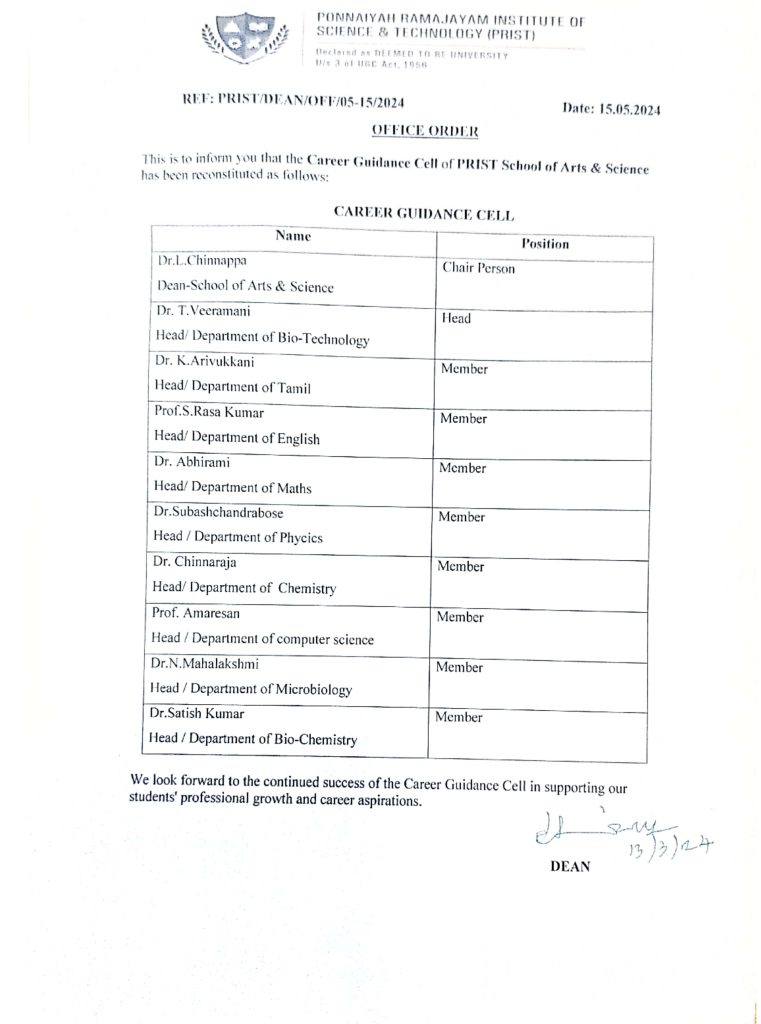
- Career Counseling Program on “Enhance Your Creative Ability” held on 24th September 2024.
- Student Activity – Quiz held on 20th September 2024.
- Soft Skills Program on “GK, Aptitude, Reasoning, and Problem Solving” held on 9th September 2024.
- Workshop on “Data Analytics Using Python” held on 3rd September 2024.
- In-House Seminar on “Recent Trends in IT” held on 9th August 2024.
- Soft Skills Program on “How to Build Up an IT Industry” held on 07th February 2024.
- National Level Technical Symposium“BRASIKO’23” held on 16th October 2023.
- Guest Lecture on “Data Science Technologies” held on 16th October 2023.
- Seminar on “Development of Communication Through Artificial Intelligence” held on 9th October 2023.
- Career Counseling Program on “GK, Aptitude, Reasoning, and Problem Solving” held on 5th October 2023.
- Workshop on “AI and Cloud Technologies” held on 08th September 2023.
- Soft Skills Program on “Development of Real-Time Applications Using Python Programming” held on 23rd August 2023.
- Career Counseling Program on “Training and Placement” held on 3rd April 2023.
- Webinar on ‘Fuzzy Inference System using SCILAB’, 21st April 2021 at PRIST Deemed to be University, Thanjavur.
- Seminar on ‘Internet of Things [IoT]’, 27th February 2021 at PRIST Deemed to be University, Thanjavur, Tamil Nadu.
- Webinar on ‘Detect of DDOS Attacks using IP Watcher and File Watcher’, 06th November 2020 at PRIST Deemed to be University, Thanjavur.
- Seminar on ‘Seminar on Virtualization Tools’, 10th February 2020 at PRIST Deemed to be University, Thanjavur, Tamil Nadu.
- Workshop on ‘Big Data Analytics’, January 28-01-2020 at PRIST Deemed to be University, Thanjavur, Tamil Nadu.
- Seminar on ‘Soft Computing’, 20th January 2020 at PRIST Deemed to be University, Thanjavur, Tamil Nadu.
- Seminar on ‘Internet of Things [IoT]’, 27th July 2019 at PRIST Deemed to be University, Thanjavur, Tamil Nadu.
- Seminar on ‘Cloud Computing’, 18th December 2019 at PRIST Deemed to be University, Thanjavur, Tamil Nadu..
Head, Department of Computer Science, School of Arts and Science, PONNAIYAH RAMAJAYAM INSTITUTE OF SCIENCE & TECHNOLOGY(PRIST), Vallam, Thanjavur -613403.
Email: hodcs@prist.ac.in
Phone: 04362-265021

